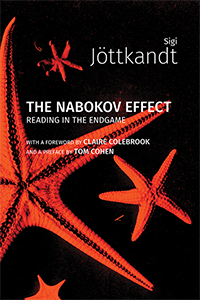The Nabokov Effect: Reading in the Endgame
by Sigi Jöttkandt

- CCC2 The Nethercene
- Published: 2024
- ISBN: 978-1-78542-134-1
- PDF ISBN: 978-1-78542-133-4
Another Nabokov stands at the 21st century, overleaping the decades to resurface when the signifier shimmers in a strange new light. Today, as we gaze spellbound at Reason’s freak show, when fantastic new figures of the Name-of-the-Father who seek not to regulate but, above all, to enjoy, strut the international stage, Vladimir Nabokov swims back into view, beckoning with a dubious invitation: what if his famous literary virtuosity fails to point back to a designing Creator figure? Could the encoded patterns in Nabokov’s novels point not to the Other Worlds critics propose, but present rather as teletechnic marks whose ‘cinaesthetic’ import de-realizes the seeming solidity and reality of this one? What if, outside of any speaking or knowing agent, something non-human, non-intentional and non-knowing were making itself felt in Nabokov’s prose in myriad photo-graphematic patterns?
Centring on these letteral events, The Nabokov Effect contends that if a “controlling presence” is indeed operative in Nabokov’s work, it will be to oversee the collapse of authorial paradigms. Jöttkandt’s book thus offers a counter to the “triumphal aesthetics” through which a certain Nabokov, humanist philosopher of subjectivity with metaphysical leanings, has been read. It takes the name “Vladimir Nabokov” as a cover for some kind of performative expression that exceeds and undoes the intentional systems it pretends to guarantee. It also means opening up once more the vexed question of Nabokov’s relation to psychoanalysis. Could Nabokov’s voluntary or conscious memory – whose true foil is not Proust but Freud and the unconscious – call forth another principle of interpretation? To read Nabokov in humanity’s endgame is to depose our central myth of Nabokov-the-Author, even as it opens up broader questions concerning our ability to read him or, indeed any writer, today.
Not herded by the moans and complicity of ‘Anthropocene Talk’, Jöttkandt offers a jewel of too close-reading of a para-canonical oeuvre—and tracks what reading-writing do in and from the Endgame, shorn of any apocalyptics or even referential tours.Tom Cohen, author of Hitchcock’s CryptonymiesIt’s as if someone has walked into a classic cinematic stand-off against Nabokov’s ghost—the kind with lots of close-ups of twitching eyes and twitching fingers intercut to Ennio Morricone—with Cinema 1 (1983) in one holster and Cinema 2 (1985) in the other. Fantastic.David Potter, The University of SydneyAuthor Bio
Sigi Jöttkandt works at the intersection of literature and psychoanalysis. She is Associate Professor of English at the University of New South Wales, and co-founding Director of Open Humanities Press. The author of Acting Beautifully: Henry James and the Ethical Aesthetic (2005), and First Love: A Phenomenology of the One (2010), and The Nabokov Effect (2024), she also edits S Journal of the Circle for Lacanian Ideology Critique. See http://lineofbeauty.org/.
